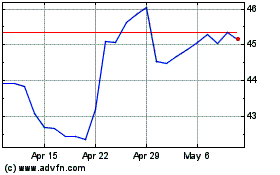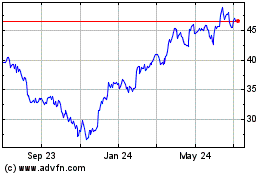The Securities and Exchange Commission plans to reverse an
earlier decision that would have allowed former Wall Street deal
maker Steven Rattner to return to the securities industry after
serving a regulatory ban for more than five years, according to
people familiar with the matter.
The about-face follows dissent within the agency over the move
in March to readmit Mr. Rattner, who in 2010 was barred from the
industry as part of an SEC settlement over his alleged role in a
pay-to-play arrangement involving New York state's flagship pension
fund. The SEC's reprieve, which was approved by its lower-level
staff, quickly unraveled because two of its commissioners later
questioned the deal and objected to not being told about it,
according to people familiar with the matter.
The agency plans as soon as this week to issue a public notice
that it is withdrawing an order that would have cleared the way for
Mr. Rattner to work for Guggenheim Securities LLC, the people said.
Mr. Rattner, whose legal troubles interrupted his work as the
leader of the U.S. government's auto-bailout program in 2009, told
the SEC that he wanted to rescind his request to be reinstated to
the brokerage industry and work for Guggenheim after learning that
commissioners would reconsider it, the people said.
Davidson Goldin, a spokesman for Mr. Rattner, said Mr. Rattner
had said "that he's no longer interested due to his full time role
as chairman of Willett Advisors," which manages the fortune of
Bloomberg L.P. founder and former New York City Mayor Michael
Bloomberg, as well as Bloomberg Philanthropies' assets. Mr. Goldin
said Mr. Rattner informed the SEC "weeks ago," and that "anonymous
sources telling you anything different are just wrong on the
facts."
The development underscores how high-profile enforcement cases
and settlements continue to bedevil the SEC. Just last week, Sen.
Elizabeth Warren (D., Mass.) criticized a settlement that will
allow another financier—Steven Cohen, whose firm pleaded guilty to
insider-trading charges—to return to managing hedge funds. SEC
officials said their settlement with Mr. Cohen imposed requirements
on him "that are even stronger than typical remedies available
under the securities laws," and vowed to "scrutinize his trading
activity closely going forward."
Mr. Rattner's case stems from his time running Quadrangle Group
LLC, a private-equity firm. Law-enforcement officials accused him
of doing favors for and paying money to state officials in
connection with a $150 million investment that Quadrangle obtained
from the New York State Common Retirement Fund in 2005 and
2006.
The settlement with the SEC banned him from working for a
brokerage firm or investment adviser for two years, and allowed him
to reapply after serving that time on the sidelines.
Mr. Rattner's application for reinstatement was initially
supported by the Financial Industry Regulatory Authority, a
self-regulatory body whose decisions must be approved by the SEC.
The SEC staff, which can act on Finra's recommendations without a
vote of the commission, issued an order approving Mr. Rattner's
request on March 14.
The deal called for Guggenheim's executives to closely monitor
Mr. Rattner's meetings, client appointments, and his "outgoing and
incoming written correspondence on a weekly basis." The deal would
have forbidden Mr. Rattner from soliciting investments from public
pension funds or managing any public-pension-fund money. Mr. Goldin
said last month that Mr. Rattner didn't plan to work for Guggenheim
immediately, but the deal "enables Steve to engage in
investment-banking activities" if he chose to return to the
business.
Commissioner Michael Piwowar, a Republican, immediately inquired
about the deal, partly because it linked Mr. Rattner to Guggenheim,
a firm that had recently been sanctioned for its own compliance
failures, the people said. Michael Sitrick, a spokesman for
Guggenheim, declined to comment.
Guggenheim Partners Investment Management LLC, the
asset-management business of Guggenheim Partners LLC, whose
investment-banking and brokerage arm is Guggenheim Securities LLC,
agreed last August to pay $20 million to settle SEC claims that it
failed to disclose a conflict of interest involving a loan that one
of its executives took from a client. The SEC's investigation
alleged that a Guggenheim Partners Investment Management executive
received a $50 million loan that permitted him to personally invest
in a corporate acquisition led by Guggenheim Partners. The loan
should have been disclosed to other Guggenheim Partners Investment
Management clients because it put the lender in a position to seek
better treatment than other investors, the SEC said. Guggenheim
didn't admit or deny the SEC's claims but agreed to pay a $20
million penalty and hire an independent compliance consultant.
Commissioner Kara Stein, a Democrat, separately questioned the
SEC staff about the deal to return Mr. Rattner to the industry,
another person said.
On March 16, the agency's officials told Mr. Rattner's attorneys
and Guggenheim Securities executives that SEC commissioners would
put the staff's decision on hold and would consider the case
themselves, the people said.
Neither Mr. Piwowar nor Ms. Stein were told about the deal to
readmit Mr. Rattner to the financial industry before it was
announced, the people said. SEC Chairman Mary Jo White wasn't
involved because she had recused herself, the people said. Before
joining the SEC, Ms. White worked in private practice and
represented a law firm, Simpson Thacher, which had defended Mr.
Rattner from the pay-to-play accusations, according to her
financial-disclosure statement.
SEC spokesman John Nester declined to comment on the reasons for
Ms. White's recusal.
Mr. Rattner was accused of paying kickbacks and arranging a
distribution deal for a state official's low-budget movie to secure
a $150 million investment from the New York fund, the country's
third-largest state pension pool. He didn't admit to wrongdoing but
agreed to pay $6.2 million to settle the SEC's claims and $10
million to settle an investigation brought by then-New York
Attorney General Andrew Cuomo.
Mr. Rattner ran the Obama administration's auto bailout program
in 2009, which took both General Motors and Chrysler LLC through
bankruptcy reorganization, before settling the bitterly fought case
in 2010.
Write to Dave Michaels at dave.michaels@wsj.com
(END) Dow Jones Newswires
April 26, 2016 21:25 ET (01:25 GMT)
Copyright (c) 2016 Dow Jones & Company, Inc.
General Motors (NYSE:GM)
Historical Stock Chart
From Mar 2024 to Apr 2024

General Motors (NYSE:GM)
Historical Stock Chart
From Apr 2023 to Apr 2024
